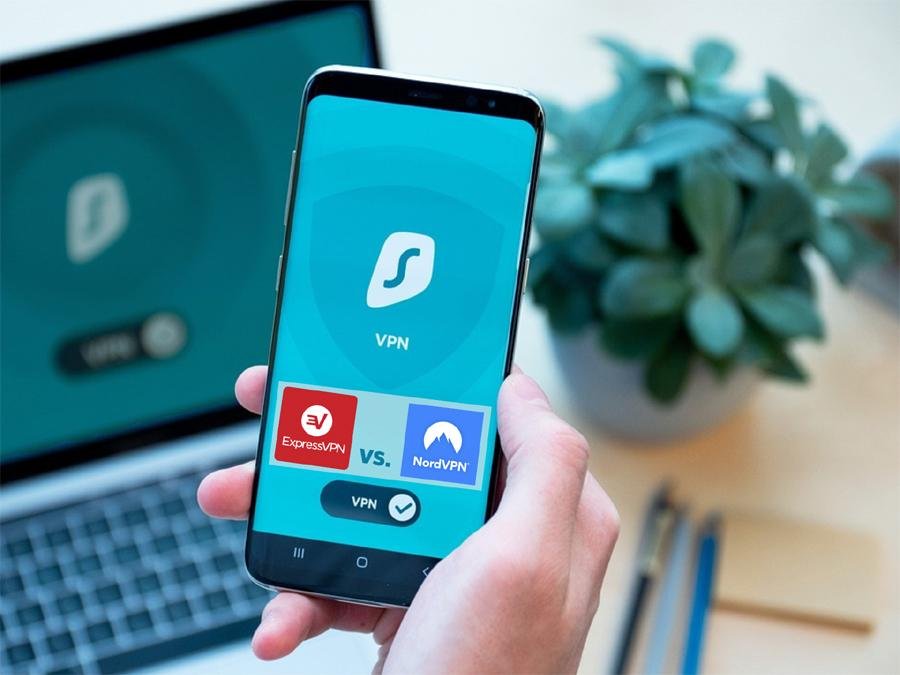Click here to buy secure, speedy, and reliable Web hosting, Cloud hosting, Agency hosting, VPS hosting, Website builder, Business email, Reach email marketing at 20% discount from our Gold Partner Hostinger You can also read 12 Top Reasons to Choose Hostinger’s Best Web Hosting
Choosing a VPN can feel overwhelming, especially when two of the biggest names—ExpressVPN and NordVPN—offer similar promises. Both claim to protect your privacy and boost your online freedom, but it’s often unclear how they really compare. Maybe you’re frustrated by conflicting reviews or slow connections and wondering if you’re paying for the right service. This guide cuts through the hype to highlight real differences in speed, security, streaming access, and price between ExpressVPN and NordVPN. By the end, you’ll know which VPN best suits your needs and why.
Speed and Performance
ExpressVPN’s Lightway Turbo protocol (illustrated by the rocket above) is designed to maximize VPN bandwidth. According to ExpressVPN, Lightway Turbo dramatically boosts OpenVPN throughput – in tests up to 2 Gbps download speeds on Windows. In practice, this means ExpressVPN can fully leverage very fast internet connections by splitting traffic across multiple CPU threads. NordVPN takes a similar approach with its NordLynx protocol (based on WireGuard), which is built for high speed and low latency. In recent SmashingApps tests, ExpressVPN under Lightway averaged 273 Mbps down, edging out NordVPN’s 247 Mbps (NordLynx) under similar conditions. Both services run on powerful servers worldwide, so actual speeds depend on your location and network. Overall, users can expect excellent performance from either provider. Key takeaway: ExpressVPN often has a slight speed edge with Lightway, but NordVPN’s NordLynx is also “lightning-fast” for gaming and 4K streaming.

Security and Privacy
ExpressVPN and NordVPN both use top-tier security. Each employs AES-256 encryption and perfect forward secrecy, along with built-in leak protection and kill switches. ExpressVPN is known for its TrustedServer design: all VPN servers run in RAM (no hard drives), so all data is wiped on reboot. NordVPN also runs diskless RAM servers and offers extra options like Double VPN (traffic through two servers) and Onion-over-VPN for advanced anonymity. NordVPN emphasizes its audited privacy stance – the company reports an independently audited no-logs policy with over 8,300 servers in 127 countries. ExpressVPN likewise asserts no activity logs (based in the privacy-friendly British Virgin Islands). In short, both services effectively hide your IP and browsing data. The main difference is that NordVPN provides more specialized privacy features (multi-hop, obfuscated servers, and an audited no-logs claim), while ExpressVPN focuses on infrastructure design (TrustedServer) to minimize any data retention.
Server Network and Coverage
NordVPN’s global server network spans 127 countries (blue dots on the map) and over 8,300 servers worldwide. ExpressVPN covers about 105 countries with roughly 3,000 servers. Both providers have extensive coverage in major regions (North America, Europe, Asia-Pacific). NordVPN’s larger server fleet can help reduce overcrowding and give more geo-unblocking options (useful for accessing regional content), whereas ExpressVPN’s network focuses on consistently fast, high-capacity servers in each location. NordVPN also offers specialty servers (P2P-friendly, double-hop, and obfuscated) in select locations, while ExpressVPN’s apps let you choose servers optimized for streaming, gaming, or maximum security. Overall, NordVPN wins on sheer scale of countries and total servers, but ExpressVPN still covers the key locations most users need and emphasizes performance consistency across them.
Streaming and Accessibility
Both VPNs excel at unblocking streaming services. ExpressVPN is often cited for its broad streaming support – in our 2025 testing it accessed 150+ streaming platforms (Netflix, Hulu, Disney+, BBC iPlayer, etc.) compared to about 100+ for NordVPN. NordVPN also consistently works with all major services and even includes specialized obfuscated servers for networks that block VPNs, but ExpressVPN’s simpler interface and dedicated “Streaming” category make it very easy to connect to a region that unblocks your desired content. Either VPN will handle Netflix, Amazon Prime, and other big platforms reliably. Note that both support split tunneling (choose which apps use the VPN vs. regular connection) and have browser extensions.
Platforms and Ease of Use
ExpressVPN and NordVPN both offer apps for every major platform: Windows, macOS, Linux, iOS, Android, as well as smart TVs and routers. ExpressVPN’s apps are renowned for a clean, beginner-friendly design (big Connect button, minimal options), making setup a one-click affair. NordVPN’s apps are also polished and include a map interface plus quick-access features, along with added tools like Meshnet (peer-to-peer VPN) and Threat Protection (malware/ ad blocking) for subscribers of its suite. In terms of simultaneous connections, ExpressVPN recently raised its limit to 14 devices per account, whereas NordVPN allows up to 10 devices by default (both have workarounds like Meshnet to extend this). ExpressVPN tends to be lighter on older hardware; NordVPN’s WireGuard-based protocol is very efficient on all devices. In summary, ExpressVPN emphasizes simplicity and broad device support, while NordVPN packs more customization and bonus services into its apps. Either will run smoothly on modern devices, so your choice may depend on whether you prefer fewer menus (ExpressVPN) or more features (NordVPN).
Pricing and Value
NordVPN generally offers lower pricing on similar plans. For example, a 2-year subscription to NordVPN is around $5/month versus about $6.67/month for ExpressVPN on a comparable long-term deal. Both providers run frequent promotions (especially around holidays), and all plans come with a 30-day money-back guarantee. ExpressVPN does not have a true basic plan – even its shortest term is pricier than Nord’s – but it often throws in bonus months during sales. Payment options differ: NordVPN accepts crypto and gift cards, while ExpressVPN also supports Bitcoin and many gift cards for added anonymity. In practical terms, NordVPN tends to give slightly more bang for your buck over multi-year subscriptions, but ExpressVPN’s pricing is competitive when including current discounts. Key takeaway: both are premium services, but NordVPN usually edges out in cost-effectiveness, especially if you find a good coupon or extended plan.
Key Takeaways
Speed: Both VPNs are very fast. ExpressVPN’s Lightway Turbo (with OpenVPN) can reach multi-gigabit speeds in practice. NordVPN’s NordLynx (WireGuard) is also extremely speedy (our tests saw ~273 Mbps vs 247 Mbps for NordVPN). Both will handle HD streaming and gaming with ease.
Server Network: NordVPN has the larger network (8,327 servers across 127 countries vs ~3,000 servers in 105 countries for ExpressVPN). A bigger network means more location choices and potentially less congestion.
Privacy & Security: Both use AES-256 encryption, no-logs policies, and have kill-switch protection. ExpressVPN’s unique TrustedServer tech (RAM-only servers) means data is wiped on reboot. NordVPN offers multi-hop (Double VPN) and Tor support, and its no-logs claim has been independently audited.
Streaming & Platforms: ExpressVPN usually unblocks more streaming services right away (150+ vs ~100 in our tests). Both support all major platforms and allow multiple devices (Express up to 14, Nord up to 10). Both also support split tunneling for app-specific routing.
Pricing: NordVPN is generally cheaper for long-term plans, while ExpressVPN costs more per month. Both come with 30-day refund policies. Always compare current deals: a discount can make ExpressVPN or NordVPN even more attractive.
Best for: ExpressVPN excels at ease-of-use and consistent speed across devices, making it ideal for streaming and general use. NordVPN shines with its larger server fleet, extra features (like Meshnet and Threat Protection), and better price, making it great for privacy enthusiasts and multi-purpose use.
FAQs
Which VPN is faster: ExpressVPN or NordVPN?
In our tests, ExpressVPN’s Lightway protocol (with Turbo mode) averaged about 273 Mbps download, while NordVPN’s NordLynx averaged about 247 Mbps. Both are extremely fast VPNs, but ExpressVPN often has a slight edge in raw speed. (Actual speeds vary by server and location.)
Which VPN is better for streaming?
Both work well with major platforms. ExpressVPN typically unblocks more regional services out-of-the-box – our 2025 review found it accessing 150+ streaming sites vs ~100 for NordVPN. If streaming is your top priority, ExpressVPN’s broad compatibility is helpful. NordVPN also covers the big streaming services and offers obfuscated servers, but double-check specific channels on each provider’s site if you have one in mind.
Which VPN offers more privacy features?
Both use strong AES-256 encryption and strict no-logs policies. ExpressVPN’s standout privacy feature is TrustedServer (diskless RAM servers that wipe data on reboot). NordVPN offers extras like Double VPN (multihop), Onion-over-VPN, and has its no-logs policy audited. In practice, both are highly secure; the main differences are optional features rather than basic security.
Which VPN is more cost-effective?
NordVPN generally has lower rates for similar plans. For instance, a 2-year NordVPN plan ran about $5/month vs $6.67/month for ExpressVPN. Both run promotions, so the actual price can vary. Remember both have 30-day trials – try them and see which offers the features you need at a price you like.
Conclusion
Choosing between ExpressVPN and NordVPN comes down to your priorities. If you want the absolute fastest connections and the broadest streaming access with a simple interface, ExpressVPN is hard to beat. If you need a huge server network, extra privacy tools (double-hop VPN, Tor access, meshnet), and better value on longer plans, NordVPN may be the better pick. Both services offer 30-day money-back guarantees, so you can try them risk-free and see which you prefer.
Importantly, stick to the official apps from the VPN providers. As security experts recommend, use only audited or well-known VPN services with clear no-logs policies. For example, our SmashingApps review of iPhone VPNs ranked NordVPN first for its speed and ExpressVPN second (noting its “lightning-fast connections”).
Your online privacy and security are worth the investment. Now you have the insights to choose confidently. Try out one (or both) of these VPNs under their money-back guarantee, and enjoy safer, unrestricted internet browsing.
Now loading...






